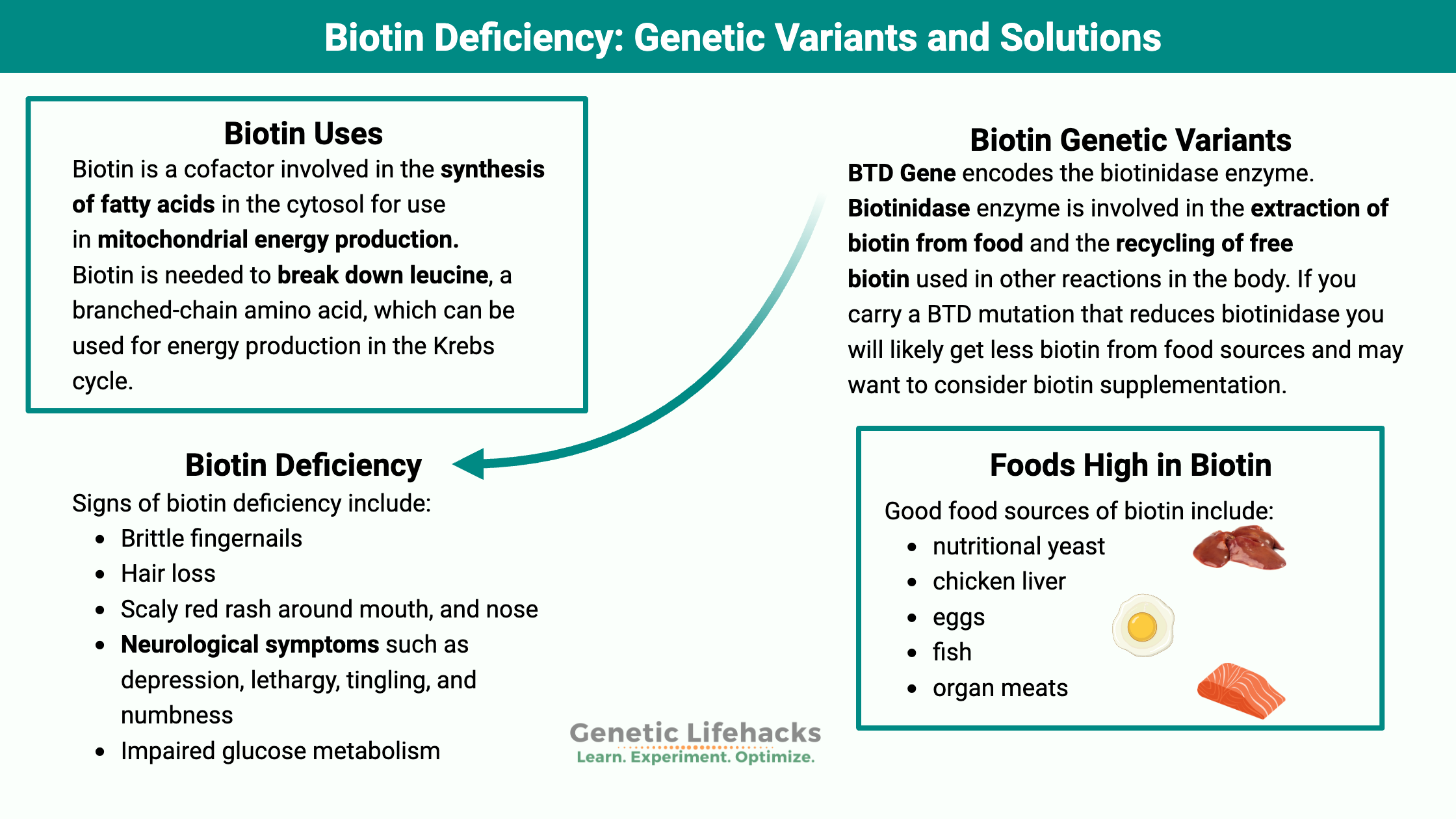Key takeaways:
~ Biotin is an essential cofactor for mitochondrial energy production.
~ Deficiency of biotin can cause hair loss, brittle nails, or a scaly rash around the mouth.
~ Genetic variants in the BTD enzyme, which is needed for the absorption of biotin from food, can cause biotin deficiency.
<b>Members</b> will see their genotype report below and the solutions in the Lifehacks section. <a href=”https://www.geneticlifehacks.com/membership/”>Consider joining today</a>.
What does Biotin do in the body?
Are you dealing with hair loss, brittle nails, or a scaly rash around your mouth? These are all signs of biotin deficiency.
Biotin, also known as vitamin B7, functions as a cofactor in five different biological pathways.
- Biotin is a cofactor involved in the synthesis of fatty acids in the cytosol for use in mitochondrial energy production.
- Additionally, it is utilized as a cofactor in gluconeogenesis reactions.
- Biotin is needed to break down leucine, a branched-chain amino acid, which can be used (eventually) for energy production in the Krebs cycle.
- It is also involved in the regulation of gene expression via histone modification.[ref]
As you can imagine, a deficiency in this essential vitamin can affect the body in various ways.
Biotin is usually abundant in the modern diet because it is found in a lot of different foods. Deficiency due to diet is pretty rare, but eating raw egg whites for an extended period can deplete the body of biotin.
Foods highest in biotin include:
- egg yolks
- nuts
- meat
- nutritional yeast
- dairy
Biotinidase: Enzyme essential for biotin
Biotinidase is the enzyme involved in the extraction of biotin from food and the recycling of free biotin used in other reactions in the body.
A deficiency in biotinidase can therefore cause someone to have a biotin deficiency, depending on their diet and supplements.
The BTD gene encodes the biotinidase enzyme. Several known BTD mutations affect the function of this enzyme.
- Profound biotinidase deficiency is defined as having less than 10% of normal enzyme activity.
- Partial biotinidase deficiency is defined as having normal enzyme activity between 10% and 30%.
Not everyone with a BTD variant is negatively affected by biotinidase deficiency[ref]. Having two BTD mutations makes a biotin deficiency more likely.
Biotin deficiency symptoms:
Signs of biotin deficiency can include:
- Brittle fingernails
- Hair loss
- Scaly red rash around mouth, nose, and genitals (often infected with Candida albicans)[ref]
- Neurological symptoms such as depression, lethargy, tingling, and numbness
- Impaired glucose metabolism
All of these symptoms relate back to the roles that biotin plays as a cofactor — in gluconeogenesis, energy production, synthesis of fatty acids, etc.
Biotin Genotype Report
Related Articles and Topics:
How do your genes influence your vitamin B12 levels?
Your genes impact your vitamin B12 needs. Learn about the different genes and check your 23andMe or AncestryDNA data to see how you may be affected.
Should you increase your vitamin C intake? Genetics and vitamin C absorption.
Like most nutrients, our genes play a role in how vitamin C is absorbed, transported, and used by the body. This can influence your risk for certain diseases, and it can make a difference in the minimum amount of vitamin C you need to consume each day.
CYP2A6: Breaking down nicotine and other medications
How many cigarettes a day a person smokes – and how hard it is for them to quit – is at least partly dependent on the CYP2A6 gene. This enzyme also metabolizes several important cancer drugs.
Fatty Liver: Genetic variants that increase the risk of NAFLD
Non-alcoholic fatty liver disease (NAFLD) can be caused by genetic susceptibility, diet, and lifestyle factors. The good news is that fatty liver disease is reversible.
References:
APJCN – Asia Pacific Journal of Clinical Nutrition. https://apjcn.nhri.org.tw/. Accessed 3 June 2022.
“Biotin.” Linus Pauling Institute, 22 Apr. 2014, https://lpi.oregonstate.edu/mic/vitamins/biotin.
Mock, Donald M. “Marginal Biotin Deficiency Is Common in Normal Human Pregnancy and Is Highly Teratogenic in Mice.” The Journal of Nutrition, vol. 139, no. 1, Jan. 2009, pp. 154–57. PubMed, https://doi.org/10.3945/jn.108.095273.
Office of Dietary Supplements – Biotin. https://ods.od.nih.gov/factsheets/Biotin-HealthProfessional/. Accessed 3 June 2022.
Pabuçcuoğlu, Aysun, et al. “Serum Biotinidase Activity in Children with Chronic Liver Disease and Its Clinical Significance.” Journal of Pediatric Gastroenterology and Nutrition, vol. 34, no. 1, Jan. 2002, pp. 59–62. PubMed, https://doi.org/10.1097/00005176-200201000-00014.
Richards, Sue, et al. “Standards and Guidelines for the Interpretation of Sequence Variants: A Joint Consensus Recommendation of the American College of Medical Genetics and Genomics and the Association for Molecular Pathology.” Genetics in Medicine, vol. 17, no. 5, May 2015, pp. 405–24. DOI.org (Crossref), https://doi.org/10.1038/gim.2015.30.
Sealey, Wendy M., et al. “Smoking Accelerates Biotin Catabolism in Women.” The American Journal of Clinical Nutrition, vol. 80, no. 4, Oct. 2004, pp. 932–35. PubMed, https://doi.org/10.1093/ajcn/80.4.932.
Srinivasan, Padmanabhan, et al. “Chronic Alcohol Exposure Inhibits Biotin Uptake by Pancreatic Acinar Cells: Possible Involvement of Epigenetic Mechanisms.” American Journal of Physiology. Gastrointestinal and Liver Physiology, vol. 307, no. 9, Nov. 2014, pp. G941-949. PubMed, https://doi.org/10.1152/ajpgi.00278.2014.
Swango, K. L., et al. “Partial Biotinidase Deficiency Is Usually Due to the D444H Mutation in the Biotinidase Gene.” Human Genetics, vol. 102, no. 5, May 1998, pp. 571–75. PubMed, https://doi.org/10.1007/s004390050742.
VCV000025016.7 – ClinVar – NCBI. https://www.ncbi.nlm.nih.gov/clinvar/variation/25016/. Accessed 3 June 2022.
Wolf, B., et al. “Profound Biotinidase Deficiency in Two Asymptomatic Adults.” American Journal of Medical Genetics, vol. 73, no. 1, Nov. 1997, pp. 5–9. PubMed, https://doi.org/10.1002/(sici)1096-8628(19971128)73:1<5::aid-ajmg2>3.0.co;2-u.
Debbie Moon is the founder of Genetic Lifehacks. Fascinated by the connections between genes, diet, and health, her goal is to help you understand how to apply genetics to your diet and lifestyle decisions. Debbie has a BS in engineering from Colorado School of Mines and an MSc in biological sciences from Clemson University. Debbie combines an engineering mindset with a biological systems approach to help you understand how genetic differences impact your optimal health.

